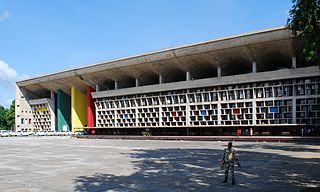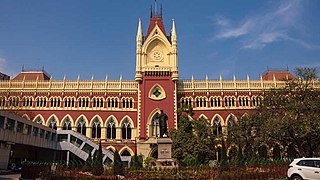Related Research Articles
The courts of England and Wales, supported administratively by His Majesty's Courts and Tribunals Service, are the civil and criminal courts responsible for the administration of justice in England and Wales.

The Supreme Court of India is the supreme judicial authority and the highest court of the Republic of India. It is the final court of appeal for all civil and criminal cases in India. It also has the power of judicial review. The Supreme Court, which consists of the Chief Justice of India and a maximum of fellow 33 judges, has extensive powers in the form of original, appellate and advisory jurisdictions.

The High Court of Bombay is the high court of the states of Maharashtra and Goa in India, and the union territory of Dadra and Nagar Haveli and Daman and Diu. It is seated primarily at Mumbai, and is one of the oldest high courts in India. The High Court has circuit benches at Nagpur and Aurangabad in Maharashtra and Panaji, the capital of Goa.

The chief justice of India is the chief judge of the Supreme Court of India as well as the highest-ranking officer of the Indian Judiciary. The Constitution of India grants power to the president of India to appoint, as dictated by outgoing chief justice in consultation with judicial cabal of 21 Supreme Court judges, the next chief justice, who will serve until they reach the age of sixty-five or are removed by the constitutional process of impeachment.

The Supreme Court of Pakistan is the apex court in the judicial hierarchy of the Islamic Republic of Pakistan.

Punjab and Haryana High Court is the common High Court for the Indian states of Punjab and Haryana and the Union Territory of Chandigarh based in Chandigarh, India. Sanctioned strength of Judges of this High Court is 85 consisting of 64 Permanent Judges and 21 Additional Judges including Chief Justice. As of 14th September 2023, there are 58 Judges working in the High Court, comprising 36 Permanent and 22 Additional Judges.

The Supreme Court of New South Wales is the highest state court of the Australian State of New South Wales. It has unlimited jurisdiction within the state in civil matters, and hears the most serious criminal matters. Whilst the Supreme Court is the highest New South Wales court in the Australian court hierarchy, an appeal by special leave can be made to the High Court of Australia.

The Supreme Court of South Australia is the superior court of the Australian state of South Australia. The Supreme Court is the highest South Australian court in the Australian court hierarchy. It has unlimited jurisdiction within the state in civil matters, and hears the most serious criminal matters. The Court is composed of a Chief Justice and as many other judges as may be required.
The high courts of India are the highest courts of appellate jurisdiction in each state and union territory of India. However, a high court exercises its original civil and criminal jurisdiction only if the subordinate courts are not authorized by law to try such matters for lack of peculiary, territorial jurisdiction. High courts may also enjoy original jurisdiction in certain matters, if so designated specially by the constitution, a state or union law.

The Calcutta High Court is one of the oldest High Courts in India. It is located at Esplanade Row West, Kolkata, West Bengal. It has jurisdiction over the state of West Bengal and the Union Territory of the Andaman and Nicobar Islands. The High Court building's design is somewhat based on the Lakenhal in Ypres in Flanders, Belgium. It is the oldest high court in India.

The Court of King's Bench of Alberta is the superior trial court of the Canadian province of Alberta. During the reign of Elizabeth II, it was named Court of Queen's Bench of Alberta.

The judiciary of India is a system of courts that interpret and apply the law in the Republic of India. India uses a common law system, first introduced by the British East India Company and with influence from other colonial powers and Indian princely states, as well as practices from ancient and medieval times. The Constitution of India provides concept for a single and unified judiciary in India.
Gyan Sudha Misra is a former judge of the Supreme Court of India. Misra was elevated as a judge of the Supreme Court of India on 30 April 2010. She has passed several landmarks and notable judgments in the Supreme Court of India including judgments on conflict of interest in the Srinivasan-BCCI matter, landmark euthanasia judgment - Aruna shaunbaug matter, and the Delhi Uphaar fire tragedy dissenting judgment holding the management liable for colossal loss of human lives and directing them to pay heavy compensation to be used for social causes like building trauma centre.

The High Court of Justice in London, known properly as His Majesty's High Court of Justice in England, together with the Court of Appeal and the Crown Court, are the Senior Courts of England and Wales. Its name is abbreviated as EWHC for legal citation purposes.
In India, a binding decision of the Supreme Court/High Court can be reviewed in Review Petition. The parties aggrieved on any order of the Supreme Court on any apparent error can file a review petition. Taking into consideration the principle of stare decisis, courts generally do not unsettle a decision, without a strong case. This provision regarding review is an exception to the legal principle of stare decisis.

Jagdish Singh Khehar is a former senior advocate and a former judge, who served as the 44th Chief Justice of India in 2017. Khehar is the first chief justice from the Sikh community. He has been a judge in Supreme Court of India from 13 September 2011 to 27 August 2017 upon superannuation. He served for a brief period but gave many landmark judgements such as the Triple Talaq and the Right to Privacy verdict. He was succeeded by Justice Dipak Misra.

Ranjan Gogoi is an Indian former advocate and judge who served as the 46th Chief Justice of India from 2018 to 2019, having previously served as a Judge of the Supreme Court of India from 2012 to 2018. He is currently a Member of the Rajya Sabha, having been nominated by President Ram Nath Kovind on 16 March 2020. Gogoi served as a judge in the Gauhati High Court from 2001 to 2010, and then was transferred as a judge to the Punjab and Haryana High Court from 2010 to 2011 where he later was the Chief Justice from 2011 to 2012. He is also a member of the Committee on External Affairs in the Rajya Sabha.
Arjan Kumar Sikri is an eminent jurist and a former judge of the Supreme Court of India. He was sworn in as a Supreme Court judge on 12 April 2013. Earlier, he had served as the chief justice of the Punjab and Haryana High Court. He retired as senior most puisne judge of Supreme Court of India on 6 March 2019.

Uday Umesh Lalit is an Indian lawyer and former Supreme Court Judge, who served as the 49th Chief Justice of India. Previously, he has served as a judge of Supreme Court of India. Prior to his elevation as a judge, he practised as a senior counsel at the Supreme Court. Justice Lalit is one of the six senior counsels who have been directly elevated to the Supreme Court. He is currently ‘Distinguished Visiting Professor’ at Ashank Desai Centre for Policy Studies, Indian Institute of Technology, Bombay. and Distinguished Visiting Professor at West Bengal National University of Juridical Sciences

The King's Bench Division of the High Court of Justice deals with a wide range of common law cases and has supervisory responsibility over certain lower courts.
References
- ↑ "Order VII - Constitution of Division Courts & Powers of a Single Judge". The Supreme Court Rules, 1966 (PDF) (2010, 2nd ed.). Supreme Court of India. 1966. p. 22. Archived from the original (PDF) on 1 November 2012. Retrieved 31 August 2012.